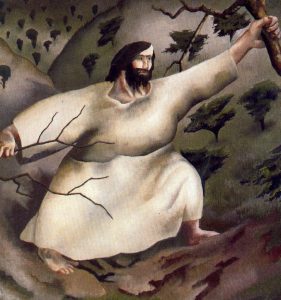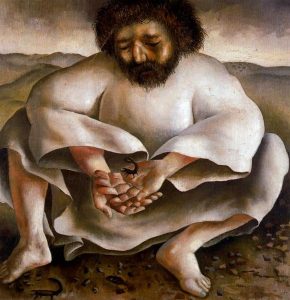Nerys writes: Have you ever ridden on the back of a bike that’s going too fast? That’s what it feels like to me sometimes when I read or listen to Mark’s Gospel. I want to shout, ‘Woah! Put the brakes on!’ In today’s Gospel passage, Mark 1.9-15, in just six sentences Mark has told the story of Jesus’ baptism in the river, his testing in the wilderness and the beginning of his ministry in the villages of Galilee. These important events whizz past and we’re on to the calling of the disciples and the stories of healing before we know it. So today, on the first Sunday of Lent, let’s put on the brakes and take some time to explore what Mark is telling us about Jesus and what we can learn from him.
So how does the passage begin? Here is the first sentence: In those days Jesus came from Nazareth of Galilee and was baptized by John in the Jordan.
Mark doesn’t set the scene for us. Mark just gives us the bare facts. Let’s use our imagination to picture the crowds of excited people on the river bank. Can you see them flocking to John, that strange figure who had appeared in the wilderness? Can you hear his voice calling them to change their ways, to ask God to forgive all the things they’d done wrong, to come into the water to be baptised as a sign of a fresh start? Can you see Jesus queuing up with all these people? I wonder what moved him to respond to John’s call when he really didn’t need to be baptized at all?
Here’s the next sentence: And just as he was coming up out of the water, he saw the heavens torn apart and the Spirit descending like a dove on him.
Mark zooms in of Jesus and what he sees as he is leaving the river. In Mark, these dramatic signs from God are just for him. The crowds are unaware of what’s happening to him. Their conversations carry on around him as the heavens are opened and he experiences an amazing vision of God who is about to do something new for the world.
This is something his people, the people of Israel, had been longing for down the generations. ‘O that you would tear open the heavens and come down, so that the nations would tremble at your presence’ was the prayer of the prophet Isaiah (64.1). I wonder if this is when Jesus first catches a glimpse of God’s purpose for him. Is this the moment when he realises that he would be the fulfilment of Isaiah’s prayer?
Then out of heaven, God’s Spirit comes down like a gentle dove, not just upon him, but into him, filling him with power of God’s love. The same Spirit of God that moved over the face of the waters of the deep at the creation of the world. The same Spirit that would empower his followers at Pentecost and continues to empower us to this day.
Something else happens: And a voice came from heaven, ‘You are my Son, the Beloved; with you I am well pleased.’
Later on in Mark, his disciples hear God speak these words about Jesus on the mountain top but just now they are for his ears only. I wonder how you imagine that voice saying those words? I wonder if you can imagine God whispering them to you right now? ‘You are my child. I love you and I delight in you.’
These words would have been familiar to Jesus. They are the words said by God in the Book of Isaiah about the Servant who is to suffer and die for the sins of the people (Isaiah 42.1-2): ‘Here is my servant, whom I uphold, my chosen, in whom my soul delights; I have put my spirit upon him; he will bring forth justice to the nations.’ I wonder if this is the moment when it becomes clear to Jesus that he is indeed God’s beloved Son, the healer humankind?
We’re left to guess what effect these words have of Jesus as Mark moves relentlessly on. And the Spirit immediately drove him out into the wilderness.
Here Mark is at his most dramatic, using the most forceful of images. The Spirit immediately hurls Jesus into the wilderness. Ruach, the Hebrew word for God’s Spirit, can mean ‘breath’ but it can also mean ‘wind’ – a powerful, disruptive force.

Stanley Spencer in the first of his famous series of paintings of Christ in the Wilderness, shows Jesus being propelled into the desert. See how he’s grabbing on to branches to steady himself as though he’s feeling a great force. Notice how his hair and cloak aren’t affected and the landscape remains still. This is an inner gale. This is God’s dynamic presence and power which continues to this day to push and pull, draw and drive God’s people here, there and everywhere, setting us on new pathways.
Mark has just one sentence on Jesus’ experience in the wilderness : He was in the wilderness for forty days, tempted by Satan; and he was with the wild beasts; and the angels waited on him.
Again, it is up to us to imagine the scene, to imagine those long days and nights in harsh, rocky surroundings as Jesus struggles with his thoughts and feelings. Mark doesn’t tell us the ways that Satan tests Jesus. We can only guess how the one who had opposed God’s people down the ages, seeks to deflect him from the path God has called him to. We aren’t given any details except that Jesus isn’t alone in the wilderness. Mark says that he is among the wild beasts and angels come to look after him.
In the Judean desert. there would have been leopards, hyenas, vultures, venomous snakes and other dangerous creatures. Can you imagine sensing their presence in the darkness of night? Stanley Spencer depicts Jesus with all kinds of animals in his paintings. In one of them, we see him with a pair of scorpions, the most feared and deadly of the wild beasts of the desert. Instead of destroying them, Jesus cradles one in his hands and another one scuttles at his feet. I wonder how we respond to those things that strike fear in us?

God sends to Jesus angels to attend to his needs, just as God did to Elijah when he was at the end of his tether. They come to feed him, to encourage him, to comfort him, to bring him hope. Jesus is not expected to endure these trials on his own. God sends his servants to provide him with all he needs. I wonder if we have known angels in our lives who have supported and encouraged us in difficult times?
Mark, once more, says nothing about the effect these experiences had on Jesus. He simply tells us what happened next: Now after John was arrested, Jesus came to Galilee, proclaiming the good news of God, and saying, ‘The time is fulfilled, and the kingdom of God has come near; repent, and believe in the good news.
Jesus leaves the wilderness ready to begin his ministry. He is sure of who he is and what he is called by God to do. It is time for him to call others to turn to God and to trust in his message of God’s unconditional love.
I invite you to take a moment to bring to mind those times where you feel close to God, when you know that you are loved and blessed. Think of those times where there is testing and difficulty , when you feel threatened, anxious, afraid. Know that God is with you all the time and that God’s love is greater than any evil. Offer it all to God.
Join with me this week to pray for all people who are living in dangerous and difficult situations:
• for people in areas of the world where there is armed conflict,
• for those whose lives and livelihoods are affected by Climate Change,
• for refugees and asylum seekers around the world,
• for people who are in prison or homeless,
• for those in our community who are struggling financially,
• for those who are lonely,
• for those who are sick,
• for those grieving a loved one.
Loving God, during this Season of Lent show us by your Spirit how we can wait on those who need our support and prayers. Amen.






